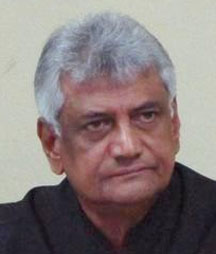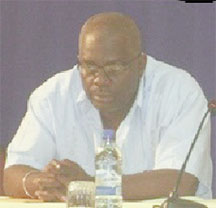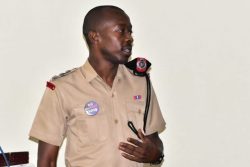Chairman of the Guyana Elections Commission (GECOM) Dr Steve Surujbally yesterday said that the commission is ahead of almost every activity as preparations continue for the May 11 general and regional elections.
Speaking at a ‘Let’s Talk’ forum organized by the non-governmental organisation Blue CAPS, Surujbally did warn that results for the upcoming polls could take longer to declare than previous elections as account has to be taken of the May/June rains and the effect this could have, particularly in far-flung areas in the vast hinterland.
The event which was attended by just about a dozen persons also saw the participation of Chief Election Officer Keith Lowenfield who noted that under the law, the Commission had 15 days within which to declare results.

Critics have said that the Commission should be able to deliver the preliminary results on the night of the elections or the morning after by having tabulations delivered electronically from all polling stations. Elections officials have, however, pointed to the requirements enshrined in the Representation of the People Act for the physical Statement of Poll to be the official record of results from each polling station.
The GECOM officials responded to concerns raised by participants and assured that the process would be fair and transparent as possible. Among the concerns raised was the number of persons on the voters’ list -570,786 persons – and the officials again acknowledged that among these are persons who would have died or migrated but that there is a difficulty in removing the names from the roll because official data from entities such the General Register Office has not been supplied.

Lowenfield disclosed that there will be 2,369 polling stations and of these, 166 will be at private residences even as they are trying as far as practicable to have polling places located in public buildings. The use of private residences at the 2011 elections had been criticized by politicians and others.
At least one political party has expressed concern about the use of private residences as polling places. Surujbally cautioned that the 166 figure could change. Lowenfield noted that as far as using schools as places of polling, there has been no problem and the Commission has been in touch with the Ministry of Education. He said that all of the polling stations will be publicised and they have already shared the locations with the political parties who indicated they wanted the information.
The officials also assured that there are multiple safeguards to ensure that persons cannot vote twice. “We have a menu of measures to stop that dead in its tracks,” Surujbally said. Among these are scrutineers and a folio containing biographic data on each person, including their photos.
In relation to the ink used to stain voters’ fingers to show that they have voted, Lowenfield said that too would make it “impossible” to vote twice as they have increased the concentration of silver nitrate in the ink.








